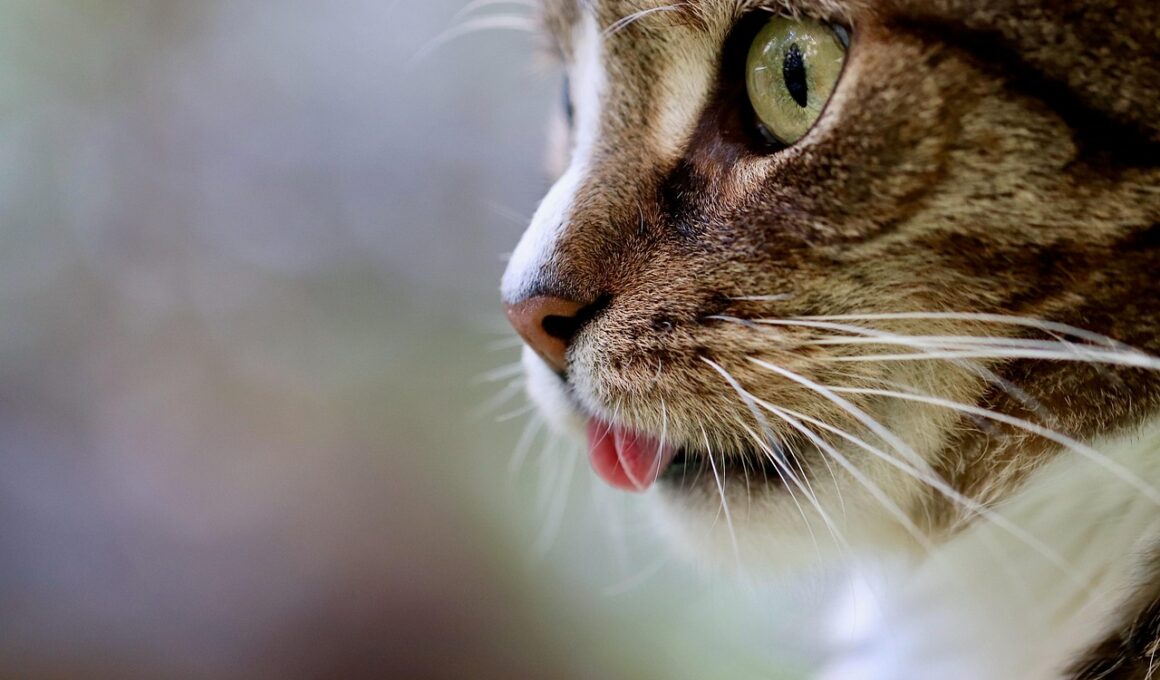Hydration and Supplement Strategies for Cats with Digestive Issues
For cats with sensitive stomachs, hydration and nutrition are essential to ensure their overall health. Cats are known for being finicky eaters, and digestive issues can make them even more so. One beneficial approach is to introduce water-rich foods into their diet, such as wet cat foods or even home-cooked options like chicken broth. It’s important to keep the food appealing by ensuring it is fresh and served at room temperature, which often entices them more than colder options. Additionally, plenty of fresh water should be available at all times; consider using a water fountain to encourage drinking. This is particularly important since hydration supports digestion and nutrient absorption. Offering ice cubes made of chicken broth or flavored water can make hydration more enticing, especially for cats that are hesitant drinkers. However, always consult a veterinarian before making significant dietary changes to ensure they address specific digestive sensitivities. It’s crucial to monitor their response to new foods and hydrations closely, adjusting as necessary to maintain their comfort and health.
Choosing the Right Supplements
When selecting supplements for your cat with digestive issues, it’s vital to choose products that cater to their specific needs. Probiotics and digestive enzymes can offer tremendous help in establishing a healthy gut flora while supporting digestion. Carefully review the labels to ensure that the supplements are formulated specifically for feline use, as some human supplements can be harmful. Look for those that include prebiotic fibers which can help maintain digestive health. It’s advisable to consult with your veterinarian regarding the types of supplements beneficial for your cat. They can recommend reputable brands based on your cat’s individual health needs. Moreover, gradual introduction of these supplements is key to preventing further stomach upset. Begin with a low dosage and observe their reactions over a week before increasing to the recommended amount. Variety is crucial; cats can become accustomed to specific flavors or forms. Incorporate different types of supplements in rotation, as this can encourage acceptance. Keeping a constant communication line with your veterinarian can help track any digestive changes and determine adjustments necessary to optimize your cat’s comfort.
Incorporating omega-3 fatty acids into your cat’s diet can significantly aid in managing digestive issues. These essential fats offer anti-inflammatory benefits which can help soothe an irritated gastrointestinal tract. They can be found in fish oil supplements or specifically formulated cat foods that highlight omega-3 content. When choosing fish oil, ensure it is safe for cats and comes from a reputable source to avoid potential toxins. Alternatively, consider flaxseed oil, but always confirm with your vet if it’s suitable given your cat’s particular health characteristics. Omega-3 supplementation not only aids digestion but also contributes to maintaining healthy skin and vibrant fur, which is beneficial after bouts of digestive distress. For some cats, capsules or liquid forms might be preferable, while others may accept them mixed in with their food. Consistency is crucial; regular incorporation into their diet supports the maintenance of their overall wellness, thus helping manage their sensitive stomach. Always watch for any signs of adverse reactions and adjust accordingly. You should be proactive in assessing how these supplements affect your cat’s behavior and digestive health over time.
Understanding Food Allergies and Sensitivities
Food allergies in cats can often manifest as digestive issues, including vomiting or diarrhea, which can be difficult for both the pet and owner to manage. Identifying specific allergens is crucial to keeping your cat comfortable and healthy. Common allergens include beef, chicken, dairy, and grains. Transitioning to a hypoallergenic diet under veterinary supervision can lead to significant improvements in your cat’s digestive health. Many brands are available that cater to sensitive stomachs, providing limited ingredient diets free from typical allergens. It may take approximately eight weeks to observe any potential improvements after switching food. Regular consultations with your veterinarian will ensure you are accurately monitoring your cat’s health and adjusting the diet as needed. In some cases, an elimination diet, where potential allergens are removed gradually, could be employed. Always introduce new foods slowly to minimize potential digestive upsets. Keep an eye on the stool quality and overall behavior throughout this process. A careful review of feeding habits combined with veterinary guidance will ensure that suitable and effective strategies are utilized for managing food allergies.
Another important aspect of managing a cat with a sensitive stomach is establishing a consistent feeding schedule. Cats thrive on routine, which can particularly help alleviate digestive stress. Offering meals at the same time every day creates predictability and encourages healthy eating habits. Additionally, consider smaller, more frequent meals to minimize the strain on their digestive system. This can prevent overeating and help in gradual nutrient absorption, which tends to reduce vomiting and nausea episodes. Using elevated feeding dishes may also benefit some cats, as they facilitate a more comfortable position while eating. Observing your cat during meal times is important; any signs of distress or reluctance to eat should prompt further investigation. Providing a calming environment during meals can enhance their comfort levels. For example, keeping their space quiet and free from disruptions or other pets can promote a more relaxed dining experience. Lastly, remember that while routine is important, flexibility may be necessary if your cat is ill or stressed. Adjust schedules accordingly to prioritize their comfort and digestive stability while keeping their daily nutrition consistent.
Monitoring Your Cat’s Health
Continuous monitoring of your cat’s health is pivotal when they have sensitive stomachs. Keeping a health journal can facilitate tracking their meals, activities, and any symptoms observed. Note any changes in behavior, appetite, or stool consistency, as these can be significant indicators of digestive health. Consult your veterinarian regularly for wellness check-ups, enabling early detection of any potential issues. Also, feeding times and routine can be adjusted if there are noticeable recurring symptoms or changes; this ensures that your cat’s digestive health is consistently prioritized. Observing how they respond to various supplements or dietary changes is essential for tailoring their nutrition. If you notice any adverse reactions, especially after introducing new supplements, discontinue use and contact your vet. Additionally, consider dietary trials with new foods to help identify any triggers. Adequate hydration should also be monitored; signs of dehydration can complicate digestive problems. Be proactive in maintaining a fluid intake record and learning signs of distress. Regular overall health evaluations will aid in ensuring your cat stays nourished, hydrated, and feels their best in the long term.
In conclusion, managing a cat’s sensitive stomach through hydration and supplements requires conscientious effort and observation. Think of the process as a holistic approach that includes proper hydration, dietary supplements, routine monitoring, and veterinary support. It’s essential to balance hydration with nutrient-rich foods while introducing supplements slowly to ensure your cat’s dietary changes are received positively. Always prioritize ingredients that are known to support the digestive wellness of felines, such as probiotics and omega fatty acids. Each cat’s needs will vary, and it’s critical to constantly adapt your strategies based on their reactions and health status. Engaging with your veterinarian will provide you with valuable insights and allow for adjustments tailored to your cat’s needs. Hydration should never be an afterthought; floral waters or broth-infused food can make all the difference. Remember to foster a stress-free dining environment while keeping feeding schedules consistent. With attentive monitoring and appropriate nutritional strategies in place, cats with digestive issues can experience significant improvements in their overall well-being, leading to happier and more comfortable lives.


